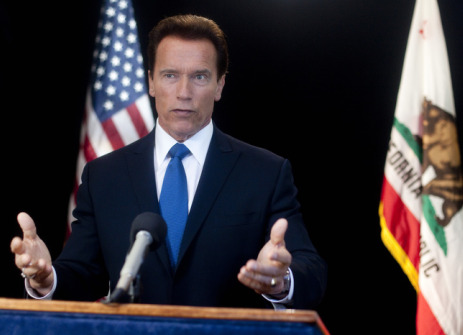 Gov. Schwarzenegger at a press conference. Photo: Office of the GovernorThe latest California ballot measure to make a national splash addresses neither marijuana nor gay marriage, but an even more contentious issue these days: cap-and-trade.
Gov. Schwarzenegger at a press conference. Photo: Office of the GovernorThe latest California ballot measure to make a national splash addresses neither marijuana nor gay marriage, but an even more contentious issue these days: cap-and-trade.
Proposition 23 would suspend California’s statewide cap-and-trade plan, currently scheduled to take full effect in 2012, until unemployment drops to 5.5 percent in the state for a full year. The carbon pricing scheme is one of Gov. Arnold Schwarzenegger’s pet projects, and it is a key component of the emissions reduction measure known in California as AB 32, which Schwarzenegger signed in 2006 despite intense opposition from the oil lobby.
Now, as the state gears up to replace Schwarzenegger in November, the industry has launched another attack on the plan, this time through a ballot measure. The California Jobs Initiative, the group behind Prop. 23, is funded largely by Texas oil companies Valero and Tesoro. When the initiative made the ballot in June, its supporters had already raised about $3 million, and it was expected to attract as much as $150 million by the November election.
Anita Mangels, the campaign’s communications director, stressed that there’s more to Schwarzenegger’s prized AB 32 than just cap-and-trade. “It has a low carbon fuel standard, which would increase gas diesel costs by $4 billion a year,” she said. “Its renewable electricity standard would cause electricity rates to rise. It has green building standards that would add $50,000 to the cost of a home.”
But so far, most Californians have not heard of Prop. 23. A new Field poll found that only 39 percent of state voters were aware of the effort to suspend AB 32. And when presented with a summary of the proposition, 48 percent of voters said they would vote against it.
 This is good news for the ballot measure’s opposition, which does not have the same fundraising capacity as the oil-backed California Jobs Initiative. At the end of June, Steven Maviglio, the spokesperson for Californians for Clean Energy and Jobs — the opposition coalition — told me that they’d raised about $1 million. “We’re never gonna match the big pockets of deep oil,” Maviglio said, “but we will be competitive. We’ve mobilized a pretty big coalition of California’s most profitable employers: Google, eBay — Silicon Valley is very supportive, and the government too.” The opposition coalition reads like a who’s who of Palo Alto, but these companies do not yet have the lobbying clout of big oil — at least in the clean energy department.
This is good news for the ballot measure’s opposition, which does not have the same fundraising capacity as the oil-backed California Jobs Initiative. At the end of June, Steven Maviglio, the spokesperson for Californians for Clean Energy and Jobs — the opposition coalition — told me that they’d raised about $1 million. “We’re never gonna match the big pockets of deep oil,” Maviglio said, “but we will be competitive. We’ve mobilized a pretty big coalition of California’s most profitable employers: Google, eBay — Silicon Valley is very supportive, and the government too.” The opposition coalition reads like a who’s who of Palo Alto, but these companies do not yet have the lobbying clout of big oil — at least in the clean energy department.
Donnie Fowler, who sits on the executive committee of the opposition campaign, explained that while Google and eBay are fully supportive of defeating the proposition, they have less riding on it than oil companies do. Funneling more money toward clean energy technology is helpful for the tech sector, but not as integral to its business model as fossil fuels are to the oil industry.
According to Fowler, $50 million, even $150 million, is “chump change for these guys:”
But we don’t have to compete dollar for dollar. About two-thirds of ballot propositions in California fail. Second, even though we’re in a weak economy in California, this is still a state that is a proud leader on climate and new energy policy. So voters here, for example, will elect Republicans, but those Republicans need to be seen as pro-environment.
Schwarzenegger is one such Republican, and he has thrown his full weight behind defeating Prop. 23 and seeing his climate legacy through.
“The governor is 100 percent opposed to this campaign,” said Adam Mendelsohn, one of Schwarzenegger’s political advisers. “I think he will be very aggressive in his fundraising on behalf of [it]. We feel optimistic that we’re going to be able to raise significant resources. Obviously the oil companies can raise unlimited amounts of money, but we feel confident. For California voters, money is not the only topic at hand.”
Mendelsohn is referring to several propositions that failed just last month despite heavily funded campaigns that dwarfed the opposition. Pacific Gas & Electric pumped $46 million into promoting Proposition 16, an initiative to discourage municipal utilities. Though opponents of the measure spent only $90,000, voters were not wooed by PG&E’s ad campaigns and voted down the proposition 52.5 to 47.5 percent. Meanwhile, Mercury Insurance funneled $16 million into Proposition 17, which would have overturned state law preventing insurance companies from using drivers’ insurance histories to set rates. Again, voters rejected the moneyed initiative by 51.8 to 48.2 percent.
Jack Pitney, a political science professor at Claremont McKenna College, told the Sacramento Bee that “if you’re going to win a special-interest initiative, you need a better disguise. The link was too obvious, and the voters smelled a rat.”
Mendelsohn agrees. Prop. 16 failed, he says, because “people believed this was an attempt by a company to deceive them. You can run all the ads you want, but people will know this was bankrolled by Valero to stop AB 32.”
Both sides are enlisting California’s top consultants, who’ve grown to specialize in the ballot measure game. Mendelsohn works for Mercury Public Affairs and has spearheaded all of Schwarzenegger’s ballot initiative campaigns for the past four years. He’s working with Winner & Mandabach, a ballot measure consulting firm with a win rate of over 90 percent. Driving the other side’s campaign is Goddard Claussen West, formerly part of the firm responsible for the “Harry and Louise” ads that handicapped Bill Clinton’s health care reform plan in the ’90s, and Woodward & McDowell, which helped beat down a 2006 proposition to reduce oil consumption and spur clean energy research.
As is often the case with California ballot measures — gay marriage, marijuana — the battle over the cap-and-trade proposition is a testing ground for the issue on a national scale. California has prodded the federal government on climate issues in the past, suing the EPA in 2007 for not allowing the state to crack down on tailpipe emissions. As Congress muddles toward an energy bill that is looking less and less likely to put a price on carbon, a climate reversal in California could affect the morale on Capitol Hill, influencing lawmakers (not to mention lobbyists).
Donnie Fowler, the opposition campaign board member, calls this dynamic “a two-front war for climate and energy progress:”
One front is Congress: it’s a fight, it’s a war, it’s a battle. We don’t know what the result’s going to be. What we do know is that the other side has opened up a second front, in effect in the home state that’s leading the clean tech charge. It’s not an either Congress or California issue — they’re both significant and essential in moving the country toward a clean energy economy.
But for Anita Mangels, the communications director for the Prop. 23 campaign, the interwoven nature of state and federal climate action works the other way. “Anything we do in California, with California acting alone, cannot have any impact on global warming,” Mangels said. “It’s a drop in the bucket as far as global warming is concerned, but not where California jobs are.”




